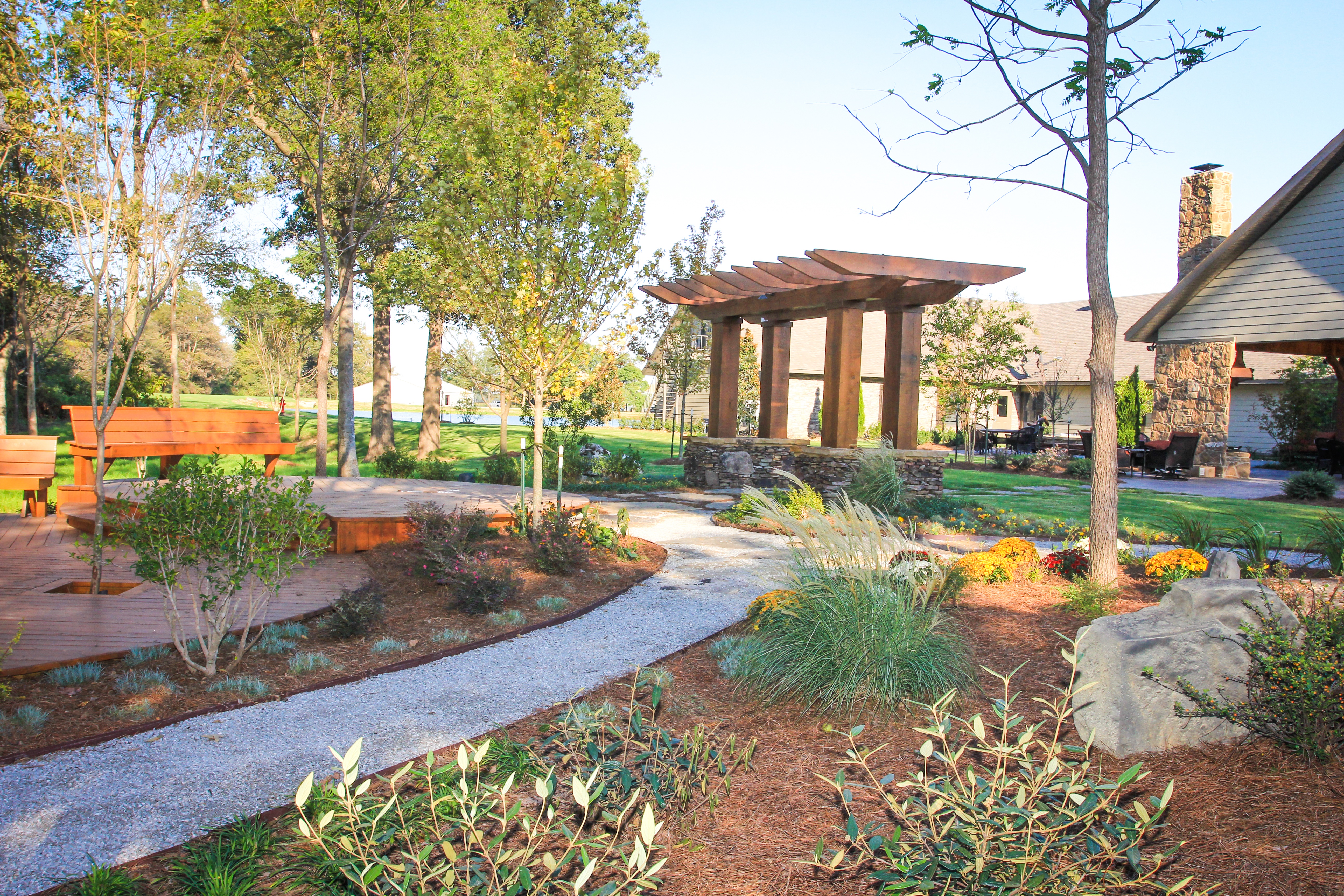.jpg?width=5184&name=STAN%20JONES%20118%20(1).jpg)
During these hot Memphis summer months, you may find yourself fretting about how to keep your lush, green landscape safe from the intense heat. The best way to battle the scorching sun is to be smart about how and when you irrigate your plants, trees, and lawn. During periods of consistent rainfall, most of the well-established trees and shrubs on your property won’t require supplemental irrigation, but when we go long stretches without rain, as happens often in the summer, these plants can decline or die without watering. Gardens, flower beds, and lawns can also suffer from a lack of precipitation if they are not cared for properly.
It is important to remember, however, that different plants will have different water requirements. People often water too much, too often, at the wrong times, and in the wrong way. This not only wastes a valuable resource, it can actually have an adverse effect. More isn’t always better, and overwatering can increase disease, insect, and thatch problems. With so many particulars to take into account, it can be frustrating to try and strike the right balance for your landscape without professional guidance.
Fortunately, the experts at Michael Hatcher & Associates, Inc. know exactly what it takes to keep each aspect of your landscape flourishing through every season. With resource conservation in mind, we use both drip and traditional irrigation systems to ensure your property is not only beautiful, but sustainable and efficient as well. To help you understand what we offer, and how our irrigation and water management services could benefit your landscape, we’ll discuss the different types of irrigation systems we use below.
Sprinkler irrigation system
Sprinkler irrigation works by mimicking the effects of natural rainfall. Using a system of pipes, pressure-regulated spray heads, and rotors, water is broken up into small drops that are dispersed in an efficient spray pattern. This system is suitable for varying sizes of land, from smaller plots to large lawns. It allows us to direct water flow to specific areas, avoiding unnecessary water loss. Some of the many benefits of a sprinkler system include:
- hands off care so you no longer need to go outside frequently to water the lawn or adjust a manual sprinkler
- reliable timer and sensor systems ensure your lawn is receiving the appropriate amount of water
- efficiently distributing the right amount of water to each area of your lawn
- rain sensors are available with some systems, turning them off during periods of heavy rain and reactivating when needed, conserving water and saving money
- soil sensors that determine the moisture level of your soil are also available with some systems

Sprinkler irrigation does require expert calibration in order to achieve optimal coverage to a given area. Equipment should be maintained, as it only takes one fault within a sprinkler system to affect its efficiency. There is also the chance of uneven water application in windy weather and extreme temperatures, water loss from evaporation during irrigation, and an increased risk of disease and fungi growth from overwatered foliage.
That said, sprinkler systems that are installed and cared for professionals such as Michael Hatcher & Associates are excellent options for keeping any lawn or garden healthy. Our expert team can install, upgrade, repair, maintain, and renovate sprinkler systems for residential and commercial properties, using only the best products and equipment to fit your unique landscaping needs.
Drip irrigation system
Drip irrigation is a localized, low-volume form of landscape irrigation. Using a network of valves, tubing, and emitters, this method reduces water and fertilizer usage by “dripping” water slowly and steadily. The system is installed below ground, and its center drip emitters come in two different sizes, 12 or 18 inches. These enable us to target the soil surface, root zone, or base of a plant, allowing for precise delivery where the water is needed most so that none is wasted. Although this type of irrigation is not appropriate for green spaces, it can efficiently irrigate non-turf areas such as flower beds, ground cover, shrubs, and trees, as well as vegetable and perennial gardens.
A drip irrigation system can be designed and installed in both new and existing landscapes. It is a highly efficient option that can save time, money, labor, and water, particularly when considering the reduction in water usage over time. While exact usage rates vary by the system, a landscape with a sprinkler system will generally use about 20-30 gallons of water per minute. In contrast, a drip system can use as little as 10 gallons per hour, making it the clear winner for water efficiency. But for many, cost efficiency is just as much of a concern.
Drip irrigation does cost a fair bit more to install than a traditional sprinkler system, but it’s important to view this through a long-terms lens. When using drip irrigation, water is delivered at a much lower pressure than required by sprinkler systems, potentially reducing erosion in certain situations.This type of irrigation also helps to minimize wasted water in the event of a leak, and prevents excessive spraying that can stain structures and pavement. Additionally, it’s not unusual for drip irrigation to cut your water use by at least 50%, leading to substantial savings in your water bill. Further benefits of drip irrigation include:
- increases effectiveness on irregularly shaped or sloped landscapes
- reduces weed prevalence since water is not on the soil surface
- the system is generally safe from damage because it is underground
- no runoff on slopes, sidewalks, or fences
- the emitter line spacing can be adjusted, and the precipitation rate along with, for varying landscape needs
- grass roots will grow deeper to seek the water, making your lawn more drought resistant, and reducing thatch build-up
- any fertilizer targeting is improved
- minimizes water contact with foliage-reducing disease risks
- no water loss from evaporation
Drip irrigation can only be used when the soil conditions are right, or if you live in a windy location. It’s also not ideal for clay soil. However, our team can customize a system for container plants. We can also run a line off an existing sprinkler system and set up automatic watering for pots on your patio or porch.
.jpg?width=5184&name=STAN%20JONES%20099%20(2).jpg)
Protecting your Memphis landscape with Michael Hatcher & Associates, Inc.
If you’re looking to keep your landscape lush throughout the hot Mid-South summers, bringing an irrigation professional in can ensure you have a system that will operate properly, water your landscape effectively, and conserve resources wherever possible.
The Michael Hatcher & Associates team includes two certified landscape irrigation contractors and three certified backflow inspectors. Our water management team will not only install the irrigation system that works best for your specific landscape needs, we will also inspect your property first to see if there are any drainage issues and fix those first using grading, drains, plant barriers and other landscape solutions. For system renovation projects, we will normally hand dig the site rather than use large equipment, in order to protect your existing plants and landscape features.
If you are in the Mid-South area and want to know more about traditional sprinkler systems or drip irrigation, we invite you to schedule a free consultation from one of our experienced landscape designers. Click here or call 901.755.3207 and we’ll be glad to help you decide if an irrigation system is the right choice for your property.


